In the quiet farming community of Philippi on the Corentyne, Bertely Matheson, 70, was relaxing in a hammock in her yard when The World Beyond Georgetown dropped in.
She moved to the village in 1962 when she got married and recalled working very hard with her husband on their cash crop farm to raise their seven children. Bertley continued farming after his death and would leave home at 8 am and return at 6 pm. She stopped going to the farm about 10 years ago and her two grandsons have taken over. One has also expanded into rice farming.
The retired farmer does not suffer from any sickness and said she maintains good health by keeping herself active with household chores and by not worrying about anything. “Stress kills,” she told this newspaper. She also prays to God for “health and strength and courage to be independent.” She attends church regularly and also strives to maintain a good relationship with everyone by visiting them especially when they are sick, and by attending funerals.
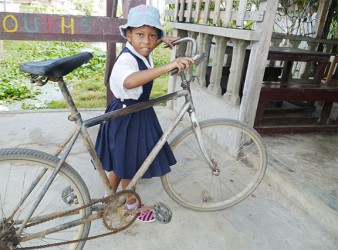
Apart from farming, residents are engaged in fishing and operating groceries and an off-licence liquor shop to earn an income.
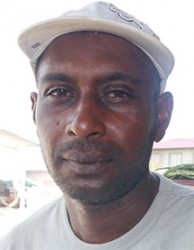
They said proudly that the village has produced “university graduates” and that some persons are working as teachers, nurses and other professionals. The village is peaceful, they said, except that a murder/suicide “rocked the community last year.”
Another resident, Viola Benn, described Bertley as a “very helpful and active person in the community” and said “she’s always there in times of need.” She also spoke highly of the Baggot family who also “assist for any occasion.”
Viola, a senior teacher at the Wellington Park Primary with over 22 years in the profession always wanted her village to be featured in the Sunday Stabroek.
She was happy that “at the moment there is development taking place where the streets are being rehabilitated.” She is an active member of the Solomon’s Temple which offers sewing and other skills training. The impressive building that was opened in 2011, has a large congregation which attends for “healing and deliverance” on Wednesdays and Sundays. Before that “bottom-house” services were held.
It also has the Liberators Gospel Band that would be hired for weddings, funerals, birthday celebrations and other events.
The church, which is headed by Pastor Ewart Baggot, also offers music classes to attract the youths. It has a beautiful flower garden with fountains, which is dubbed the ‘Garden of Eden.’

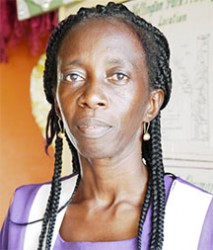
The building got most of its furnishings from Egypt, including chairs which would “fold automatically when empty.” This was made possible by Egbert Baggot who resides in Egypt and who had undertaken the architectural design for the church.
Viola whose parents have both passed on has seven siblings. Her mother was a housewife and strict disciplinarian while her father, a farmer, was the spokesman for the village. “People also came to him for advice on how to find the boundary for their land,” she said.
Her sister, Timolin remembered the “great time” she had growing up in the village. After completing high school, she joined the Guyana Police Force. She left the force to migrate to the United States but moved back to Guyana a few years ago.
Farming
Philippi, located between Kilmarnock and Cromarty, is made up of mixed ethnicities and was once thriving in terms of rice, cash crops and livestock farming, but residents said poor drainage is now affecting their crops. They lamented that they have to continue with farming because the land is available and they keep hoping that it will get better. They leave the crops to the “mercy of God.”
‘Bayo,’ a cash crop farmer, said the Cromarty sideline trench has been abandoned since 1994 when it was last dug and is now clogged up. The authorities had promised to send an excavator to clear the trench and residents were disappointed
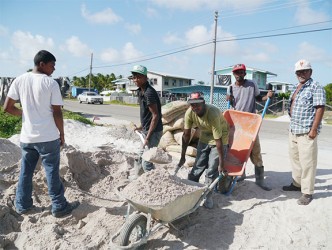
that it had not come as yet. Bayo lashed out that “government only looking after rice farmers and not cash crop farmers. I don’t know if people would eat rice alone.”

Contacted, Regional Chairman of Region Six, David Armogan told The World Beyond Georgetown that the promises to have the trench cleared would be fulfilled in less than a month.
The excavator is “currently working in Central Corentyne and as soon as it is free it would go to there [Philippi],” he said. The chairman sai too that the region has been working with all the NDCs to maintain the residential drainage with the 12 small excavators it possesses.
The crops would also be affected by diseases and the farmers cannot afford the high cost for the chemicals that are required for spraying. They also lamented the lack of job opportunities for the young people who have also tried their hands at farming. They told this newspaper that they were discouraged after losing their crops.
Residents said there is a “decline in moral standards where the men and young boys would engage in consuming alcohol and would curse and behave bad.” A multi-purpose building that was established 10 years ago has been standing in the village as a monument. It was expected to facilitate skills training and residents would like it to be put to use.
Leon Small who is originally from Liverpool, Corentyne has been living in the village for 10 years with his wife and one-year-old daughter. He is engaged in livestock and cash crop farming.
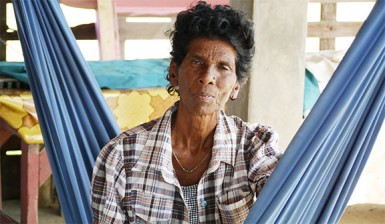
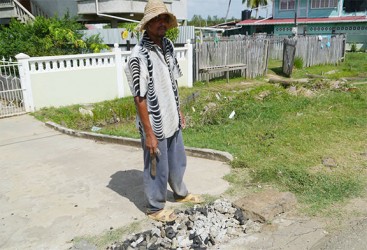
When this newspaper caught up with him he was filling up potholes at the entrance to his home. He said heavy-duty vehicles would “drive along the parapet and damage it and when the rain fall it would sink.”
Poor business
A little farther up the road, 33-year-old Dhaneshwar Garbaran was attending to customers at his grocery and liquor shop. The businessman who has been living in the village all his life said “cost of living is very high and there is no spending power.” He depends on residents who are mostly farmers and when they lose their crops his business suffers more.
He too feels there should be more well-paid jobs for the youths, noting that a recently established factory in a neighbouring village is “paying cheap labour.”
Desmond Baggot, 23, a customer at Dhaneshwar’s shop was shy at first to comment. He is one of the youths who lost his crop that he had invested in with his brother. Now they do not have the money to reinvest. He had gotten a job at the factory but the money and hours did not suit him and he quit.
He currently works as a labourer with rice farmers and earns more, but unfortunately that work “is not regular.” Sometimes we would “get a three-day or barely one day [per week].” He is “willing to work because I’m trying to build a future” and in the meantime, he is rearing livestock. He called on the government to “establish a factory to create jobs.” Many youths have left the village to go to Suriname to work at a banana factory. Some have also gone there to work on a large trawler.
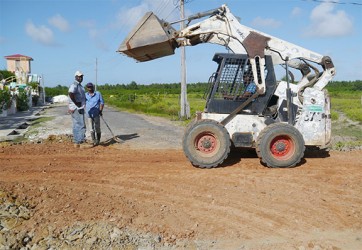
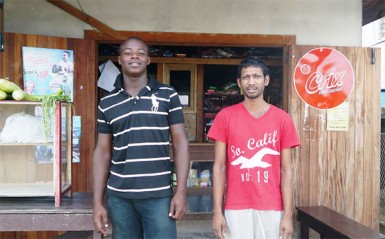
A young boy who has dropped out of school entered the shop to make a purchase. He works as a labourer with rice farmers but residents feel he should get involved in a “trade.” He is from a “neglected household,” they said. He told Sunday Stabroek that when he is not working he would go to the school to “lime on the girls.”
Recreational facility
Residents said the area does not have a recreational facility to keep young people, especially the drop-outs, occupied in positive activities. They said some of the youths would “walk around aimlessly and just waste time…” They urged persons who own land to donate a portion for a playfield. In the meantime, they would use a ground at Wellington Park, two villages away. But the facility is privately owned and they hardly have access to it. Other than that, they would “play at the waterside.” Residents lamented that the youths are talented in cricket, football and volleyball and should be given a chance to develop their skills.
Another youth, Andrew Campbell, 17, attended the Bush Lot Secondary School and was successful at the Caribbean Secondary Education Certificate exams. He too is unable to get a job and plans to “go away to St Kitts” in search of one.
Pertab Bridglall, 39, does farming aback of Philippi but hails from the neighbouring village of Cromarty. He pointed out that “you have to work hard if you want to make it in life.” His wife along with their two children, aged nine and 13 assist on the farm sometimes.
School had dismissed for the day and seven-year-old Paloma Loojune’s mother, Wendy Williams had picked her up. The child ran into the shop to retrieve a big bicycle which her mother had left there, and started pushing it out. Williams, who has a younger son, vends at the Rose Hall Town market two days per week. She has been in this business for the past 10 years.
Along the roadside, an elderly resident, called ‘Kappa’ was looking on as some young men were mixing cement to construct a house. He lives on the opposite side of the road with his grandson, 18, who work sometimes as a labourer with rice farmers. The pensioner moved from Bush Lot Village, Corentyne 50 years ago after his parents bought a house in the village. At that time the village was mostly populated by African-Guyanese who are the original owners, but who sold portions of land to Indians from other communities. According to him, “There were hardly any homes, but it was a going village with farming and livestock.” Many of the residents have migrated or passed on, he said.
At the time of this newspaper’s visit, a street was being rehabilitated through the Neighbourhood Democratic Council. Elroy Haynes, supervisor for the project told this newspaper that the work started two days earlier and was expected to be finished within a few days.




